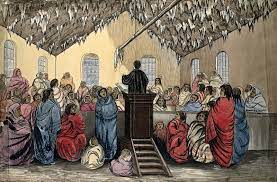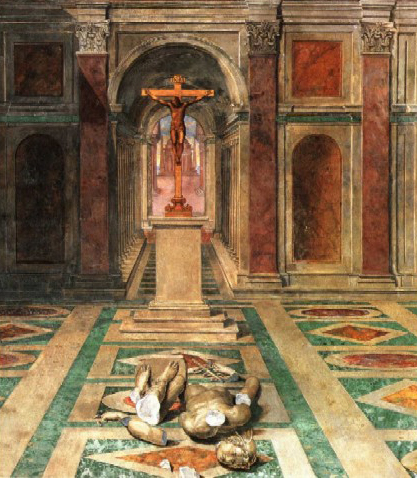Despite the polemics that the name of the Führer still unleashes, more than a quarter of a century after the disappearance of his physical person, his initiation into a powerful esoteric group, in direct connection with the primordial Tradition, is no longer in doubt.
Certainly, his detractors—and there are many!—have tried to present him as a man driven to all kinds of excesses, having been driven by his ‘hubris’ to betray the spirit of his spiritual masters. Or they saw in him a master of error, a disciple of ‘black magicians’, himself the soul and instrument of subversion (in the metaphysical sense) at its most tragic. But their clarity is suspect only because they all take the ‘moral’ point of view—and a false morality, since it is supposedly ‘the same for all men’.
What repels them, and prevents them a priori from recognising the truth of Hitlerism, is the total absence of anthropocentrism, and the enormity of the ‘war crimes’ and ‘crimes against humanity’, to which he is historically linked. In other words, they reproach him with being at odds with ‘universal consciousness’.
______ 卐 ______
Editor’s note: What Aryans don’t understand is that one has to reject theism and embrace pantheism to save one’s race (see my last comment in another thread).
______ 卐 ______
But the all-too-famous ‘universal conscience’ doesn’t exist; it has never existed. It is, at most, only the set of prejudices common to people of the same civilisation, insofar as they don’t feel or think for themselves, which means that it is not ‘universal’ in any way. Furthermore, spiritual development is not a matter of morality but of knowledge; of direct insight into the eternal Laws of being and non-being.
It is written in those ancient Laws of Manu, whose spirit is so close to that of the most enlightened followers of the Führer, that ‘a Brahmin possessing the entire Rig Veda’ (which doesn’t mean knowing by heart the 1009 hymns which compose it but the supreme knowledge), the initiation (which would imply the perfect understanding of the symbols hidden therein under the words and images they evoke) it is written, I say, that such a Brahman ‘would be stained with no crime, even if he had slain all the inhabitants of the three worlds, and accepted food from the vilest man’.[1]
______ 卐 ______
Editor’s note: This reminds me of ‘Dies irae’, the first essay in my Day of Wrath. The error of Christians and secular neochristians—virtually all whites—is that they think through New Testament value codes; not like the Star-Child.
______ 卐 ______
Certainly, such a man, having transcended all individuality, could only act dispassionately and, like the sage spoken of in the Bhagawad-Gîta, ‘in the interest of the universe’. But it doesn’t follow that his action would correspond to a ‘man-centred’ morality. There is even reason to believe that it could, if need be, deviate from this. For nothing proves that the ‘interest of the Universe’—the agreement of the action with the deep requirements of a moment of history, which the initiate grasps from the angle of the ‘eternal Present’— sometimes doesn’t require the sacrifice of millions of men, even the best.
Much has been made of Adolf Hitler’s membership (as well as that of several very influential figures of the Third Reich, including Rudolf Hess, Alfred Rosenberg, Dietrich Eckart) in the mysterious society founded in 1912 by Rudolf von Sebottendorf. Much has also been said about the decisive influence on him of readings of a very particular esoteric and messianic character, among others the writings of the former Cistercian monk Adolf Josef Lanz, known as Jörg Lanz von Liebenfels, founder (in 1900) and Grand Master of the ‘Order of the New Temple’, and his journal, Ostara (founded in 1905). We did not fail to recall his close connection with the geopolitician Karl Haushofer, member of the Société du Vril, versed in the knowledge of secret doctrines, which would have been revealed to him in India, Tibet and Japan, and very aware of the immense ‘magic power’ of the Swastika.[2]
Finally, the particular role of initiator played by at least Dietrich Eckart—if not Eckart and Rudolf Hess, although both have always presented themselves in public life as his faithful disciples and collaborators—has been emphasized. Eckart is said to have declared, in December 1923, on his deathbed, before some of his brothers of the Thule Society, that the masters of the said Society, including himself, would have given Adolf Hitler ‘the means of communicating with them’, that is, with the ‘higher unknowns’ or ‘intelligences outside of humanity’, and that he, in particular, would have ‘influenced history more than any other German’.[3]
It should not be forgotten that, whatever the initiatory training he underwent later on, it seems certain that the future Führer was already ‘between the ages of twelve and fourteen’ and perhaps even earlier, in possession of the fundamental directives of his historical ‘self’; that he had already shown his love for art in general, and especially for architecture and music; that he had already shown interest in German history (and history in general); that he was an ardent patriot; that he was hostile to the Jews (whom he felt to be the absolute antithesis of the Germans); and finally, his boundless admiration for all of Richard Wagner’s work.
It seems certain, from the account of his life up to the age of nineteen given by his teenage friend August Kubizek, that his great, true ‘initiator’—the one who really awakened in him a more than a human vision of things before any affiliation with any esoteric teaching group—was Wagner, and Wagner alone. Adolf Hitler retained all his life the enthusiastic veneration he had, barely out of childhood, devoted to the Master of Bayreuth. No one has ever understood or felt the cosmic significance of Wagnerian themes as he did—no one, not even Nietzsche who had undoubtedly gone some way towards knowing the First Principles. The creation of Parsifal remained an enigma for the philosopher of the ‘superman’, who only grasped the Christian envelope. The Führer, on the other hand, knew how to rise above the apparent opposition of opposites—including that which seems to exist between the ‘Good Friday Enchantment’ and the ‘Ride of the Valkyries’. He saw further ahead.
______ 卐 ______
Editor’s Note: We’ve talked a lot about Parsifal on this site, and I’ve also read what Nietzsche says about that opera (he loved the Prelude). If we take into account what I and others have been saying about Bach’s music, we see that Parsifal was a step forward in that syncretism of the Christian with the Pagan: something that Hitler understood perfectly, although the ultimate goal was pan-Germanic Paganism stripped of Christian influence. The Wagnerian Richard Strauss, who premiered works during the Third Reich, could have continued crossing that bridge but the Allies took it upon themselves to cut off neopagan culture and impose consumer capitalism, or communism, on both sides of the Berlin Wall.
Above I mentioned my ‘Dies irae’. To understand Richard Strauss better, remember what I say there about a symphonic poem I listened to countless times in my bedroom as a teenager: Thus Spoke Zarathustra, Strauss’s opus 30.
______ 卐 ______
Behind the ‘poetic setting of Wagnerian drama’, Hitler welcomed ‘the practical teaching of the obstinate struggle for selection and renewal’[4] and in the Grail, the source of eternal life, the very symbol of ‘pure blood’. And he praised the Master for having been able to give his prophetic message both through Parsifal and the pagan form of the Tetralogy. Wagner’s music had the gift of evoking in him the vision not only of previous worlds, but of scenes of history in the making; in other words, of opening the gates of the eternal Present—and this, apparently, from adolescence, if we are to believe the admirable scene reported by Auguste Kubizek which would have taken place following a performance of Wagner’s Rienzi at the Linz Opera House, when the future Führer was sixteen. The scene is too beautiful not to take the liberty of quoting it in full.
______ 卐 ______

Editor’s note: Wagner’s opera is about the life of Cola di Rienzi, a papal notary turned political leader, who lived in medieval Italy and succeeded in overthrowing the noble classes in Rome and giving power to the people. Magnanimous at first, he had to quell a revolt by the nobles to regain their privileges. In time, popular opinion changed, and the Church, which at first was in his favour, turned against him. At the end of the opera the people burned the Capitol in which Rienzi and a few followers met their fate.
______ 卐 ______
On leaving the theatre in Linz, where they had just seen a performance of Richard Wagner’s Rienzi, the two young men, Adolf and Augustus, instead of going home took, even though it was already past midnight, ‘the path leading to the top of the Freienberg’. They liked this deserted place because they had spent many a beautiful Sunday afternoon there alone in the middle of nature.
Now it was young Adolf who, visibly upset after the show, had insisted that they return there, despite the late hour or perhaps because of it. ‘He (Adolf) walked on’, writes Augustus, ‘without saying a word, without taking my presence into account. I had never seen him so strange, so pale. The higher we climbed, the more the fog dissipated…’
I wanted to ask my friend where he wanted to go like that, but the fierce and closed expression on his face prevented me from asking him the question… When we reached the top, the fog in which the city was still immersed disappeared. Above our heads the stars were shining brightly in a perfectly clear sky. Adolf then turned to me and took both my hands and clasped them tightly between his own. It was a gesture I had never seen him do before. I could feel how moved he was. His eyes shone with animation. The words did not come out of his mouth with ease, as usual, but in a choppy way. His voice was hoarse, and betrayed his upset.
Gradually he began to speak more freely. Words poured out of his mouth. Never before had I heard him speak, and never again was I to hear him speak as he did when alone, standing under the stars, we seemed to be the only creatures on earth. It is impossible for me to relate in detail the words my friend spoke in that hour before me.
Something quite remarkable, which I had never noticed when he had previously spoken struck me then: it was as if another ‘I’ was speaking through him: an Other, in contact with whom he was himself as upset as I was. It was impossible to believe that he was a speaker who was intoxicated by his own words. Quite the contrary! I rather had the impression that he himself experienced with astonishment, I would even say with bewilderment, what was flowing out of him with the elemental violence of a force of nature.
I dare not pass judgment on this observation. But it was a state of rapture in which he transposed into a grandiose vision, on another plane, his own—without direct reference to this example and model, and not merely as a repetition of this experience—what he had just experienced in connection with Rienzi. The impression made on him by this opera had, rather, been the external impulse that had compelled him to speak. Like the mass of water, hitherto held back by a dam, rushes forward, irresistible, if the dam is broken, so the torrent of eloquence poured out of him, in sublime images, with an invincible power of suggestion, he unfolded before me his own future and that of the German people…
______ 卐 ______
Editor’s Note: For decades I have called this phenomenon ‘the language of the Self’. (Alas, in Neanderthal land where I live, I never had a chance to use it on a mortal; only in my soliloquies.)
______ 卐 ______
Then there was silence. We went back down to the city. The clocks in the church towers struck three in the morning. We parted in front of my parents’ house. Adolf shook my hand. Stunned, I saw that he was not going home but back up the hill. ‘Where do you want to go again?’, I asked him, puzzled. He answered laconically: ‘I want to be alone’. I followed him for a long time with my eyes, while he went up the empty street in the night, wrapped in his dark coat.[5]
‘And’, Kubizek adds, ‘many years were to pass before I understood what that hour under the stars, during which he had been lifted above all earthly things, had meant for my friend’. And he reports a little later on the very words that Adolf Hitler pronounced, much later, after having recounted to Frau Wagner the scene that I have just recalled, unforgettable words: ‘It was then that everything began’. That was when the future master of Germany was, I repeat, sixteen years old.
_________
[1] Laws of Manu, Book Eleven, verse 261.
[2] Brissaud: Hitler et l’Ordre Noir (op. cit.), page 53.
[3] Ibid., pages 61-62.
[4] Rauschning: Hitler m’a dit (op. cit.), page 257.
[5] Auguste Kubizek, Adolf Hitler, mein Jugendfreund, 1953 edition, pages 139-141.










